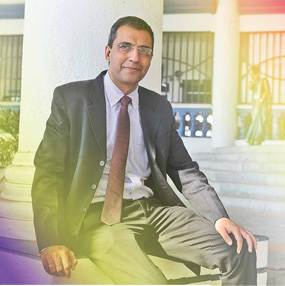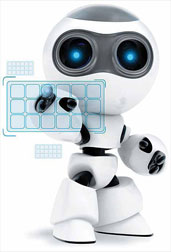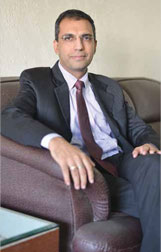
‘Automation is happening and that is a real concern for a lot of companies. For example, if you see the IT industry, a lot of jobs they do will be automated in the next five to ten years. With a lot of robots coming in, it is a good trend and a bad trend as well. It will lead to quite a bit of unemployment few years down the line’
Gaurav Dua, Global Senior Vice President (GSVP) – Consulting, Frost & Sullivan, who is one of the key leaders involved in the setting up of a global innovation centre for consulting/research in Malaysia believes industries need to embrace new technologies to survive and grow – because disruptive technologies and automation across industries will determine the paths of the future
As the Global Senior Vice President at Frost & Sullivan, based out of Malaysia, I work across geographies and across sectors, predominantly on various kinds of consulting and research projects. I am also working with our clients very closely on various kinds of transformational programs in the field of Sales, Marketing and Innovation that we want to drive as per our clients’ requirements. Of course, it entails quite a bit of travelling. I am based in a place called Iskandar, which is a new smart city coming up on the border of Singapore and Malaysia. We are setting up a global innovation centre in that city - the reason I decided to move there and contribute to the building up of that centre.
The Global Research Centre at Frost & Sullivan is an interesting initiative where we are trying to set up a hub, a centre of excellence and innovation hub, to cater to our global clients from Europe, Americas, APAC, Middle-East, Africa and so on. The entire objective is to showcase Malaysia as a destination for high-end consulting and cutting edge research. We have close to 150 odd consultants/analysts based out of that centre and we have a pretty ambitious goal to ramp it up to 800 odd people by 2020.
We work with clients across sectors including manufacturing, public sector, technology, telecom, healthcare/pharmaceutical and so on. In terms of the kind of projects that we do, it could be anything from market entry strategy, product feasibility, competitive benchmarking, market assessment, market sizing, product assessment etc. So it is quite diversified. The beauty of Frost & Sullivan is we cut across sectors, so we have analysts and experts catering to different sectors and sub sectors globally.
We cater, right from fortune 100 companies, to a lot of small and medium size enterprises as well. We also cater to some of the startups who are trying to make it big and they want some consulting support in terms of which parties to cater to and which products to launch in the market. So we have a much diversified clientele. This is because Frost & Sullivan has been in the market for almost close to six decades now; we started way back in 1961. Some of the biggest and best names you can think of in the industry are our clients and we have been working with them for quite some time now.

There is so much disruption happening today in the industry, be it in terms of business model or in terms of disruptive technologies, that organisations are unsure whether they will survive in the next five to ten years down the line. They want us to tell them what the big and disruptive trends out there in the industry are that will impact their business. So, we work with them closely and help them understand what these disruptive technologies mean to them and their business, how to mitigate the risks, and help them to move up the curve in terms of the next big things they want to do, be it in regards to product diversification, innovation in terms of the business model and other related areas.
Disruption is happening on multiple accounts. One is disruption related to the business model, like you have seen with companies like Uber, Airbnb and Netflix which have completely disrupted the business model in the respective industry that they are operating. The second disruption that we are seeing relates to technologies. Just to give you an example, artificial intelligence is one of the biggest and the most disruptive things we are seeing in the market today. As a result, big technology companies like Google, Apple, Facebook, Microsoft and so on are buying and acquiring artificial intelligence companies like crazy, because that’s where the future lies. That is one big trend we are seeing in the technology space. Another big trend is around Big Data analytics. A lot of companies are struggling today because of the huge amount of data that is being generated. Earlier, data was very structured; today you are talking about lot of unstructured data being generated from various kinds of mediums, including social media like Twitter, Facebook, LinkedI`n and so on. Now, how do you make sense of such a large data? That’s how Big Data has become so important today for a lot of organisations. We see a lot of companies actually spending money to really implement some of the big data technologies and to make sense of the data that they have.
Artificial intelligence is a branch of computer science that aims to create intelligent machines. Some of the examples of AI technology include Robotics Process Automation, Machine Learning and Natural Language Processing. Robotics process automation is catching up really fast and it will eliminate lot of jobs in the near future. For example, if you see the IT industry, a lot of jobs they do will be automated in the next five to ten years. With a lot of robots coming in, it is a good trend and a bad trend as well. It will lead to quite a bit of unemployment few years down the line. However, you cannot stop technology or disruption happening. This is bound to happen. The key is how you adjust and how fast. The moot point out here is, rather than staying away from it, companies that embrace technology and make the best use of technology will stay ahead of the curve. Otherwise, companies will struggle and perish and we have so many examples of those in the last few years.
To be honest, there’s a serious threat to manufacturing, for, that’s where you can automate a lot of things. Service industries like IT services can be automated, so that is another big industry that would likely go that way. From India’s standpoint, BPO (Business Process Outsourcing) industry which is very process oriented, lot of activities can be automated and one can expect lot of jobs being made redundant in the next few years. So it is going to be all-pervasive, as artificial intelligence and robotics will play a very critical role in some of these industries.
‘Rather than staying away from it, companies that embrace technology and make the best use of technology will stay ahead of the curve. Otherwise, companies will struggle and perish. There’s a serious threat to manufacturing, for, that’s where you can automate a lot of things. Services industries like the IT services can be automated, so that is another big industry that would likely go that way. From India’s standpoint, BPO (Business Process Outsourcing) which is very mechanical in nature, can get automated. So it
Exactly. The key is to embrace technology. If you don’t then be it an individual or an organisation, you will find it really difficult to sustain in this market
It is difficult to put a number to it, but the way we look at it - it is not just about getting the number right. When we predict and give recommendations to our clients, it is not the size of the opportunities, like whether the market may grow from X to Y and touch ‘$X’ billion by so and so years. The key thing is, are we directionally correct? The recommendations that we give to our client are based on lot of analysis, facts and figures. Nobody can predict the future. However, the key thing is, we should not be off tangent, that is the key thing that we always keep in mind. Whatever recommendations we give is backed by a lot of research; hypothesis tried and tested methodologies that Frost & Sullivan has adopted and practised in the last few decades.
In terms of research skills, I would say India has talent in abundance. It is just a question of polishing these skills. Today, India has so many home grown startups. Earlier, we only used to hear about startups coming from Silicon Valley or somewhere in Europe, but now we really see home-grown startups coming in from India. Which basically means, since the last five to ten years there has been a massive change in our thinking and our ability to conduct in-depth research and come up with innovative ideas. We are becoming more entrepreneur-oriented society. People are willing to take that risk, they do not fear failure; they want to try again even if they have failed once or twice. That is the beauty; that is the big change I am seeing right now in India.

from it, companies that embrace technology and make the best use of technology will stay ahead of the curve. Otherwise, companies will struggle and perish. There’s a serious threat to manufacturing, for, that’s where you can automate a lot of things. Services industries like the IT services can be automated, so that is another big industry that would likely go that way. From India’s standpoint, BPO (Business Process Outsourcing) which is very mechanical in nature, can get automated. So it is going to be all-pervasive’
I am from Delhi and my parents still reside there. I stay with my wife (Shweta) and two kids in a new city that has come up on the border of Singapore/Malaysia. My daughter (Riya) is seven years old and my son (Aryan) is four years old. Malaysia is a very nice country and it has a lot of similarities in culture with India.
My parents for being the pillar of strength and my wife for being so supportive and coping up with my crazy schedule and travel all these years. My dad has been by biggest critic. It has never been easy to please him and now when I look back I realise that whatever little I have achieved in life I owe it to him.
Right from my graduation days, I was very clear that I wanted to be a consultant. I got myself acclimatised to the consulting environment by reading lot of books, consulting magazines and journals and then went on to pursue my MBA. I think it is very important to have clarity of thought and that’s my advice to young students too. Be very sure about what you want to do in life and don’t get swayed by economic cycles. Ups and downs will come, but at the end of the day you need to be clear about your passion. And if you work towards that, it’s no longer a job, it is like a hobby for you, which is turn helps you to really succeed in that field.
I truly believe that there is no substitute for hard work. Perseverance, hard work and being honest to yourself and your profession are the keys to success. If you really have a passion towards something, don’t get swayed by what’s happening in the market or don’t get concerned by how you are doing currently. However, you should be setting up big dreams for yourself and just keep on working hard and have that patience. Eventually, you will win! I end with this famous quote from Steve jobs, someone who has inspired me a lot
“Your work is going to fill a large part of your life, and the only way to be truly satisfied is to do what you believe is great work. And the only way to do great work is to love what you do” ~ Steve Jobs
by Vinita Deshmukh